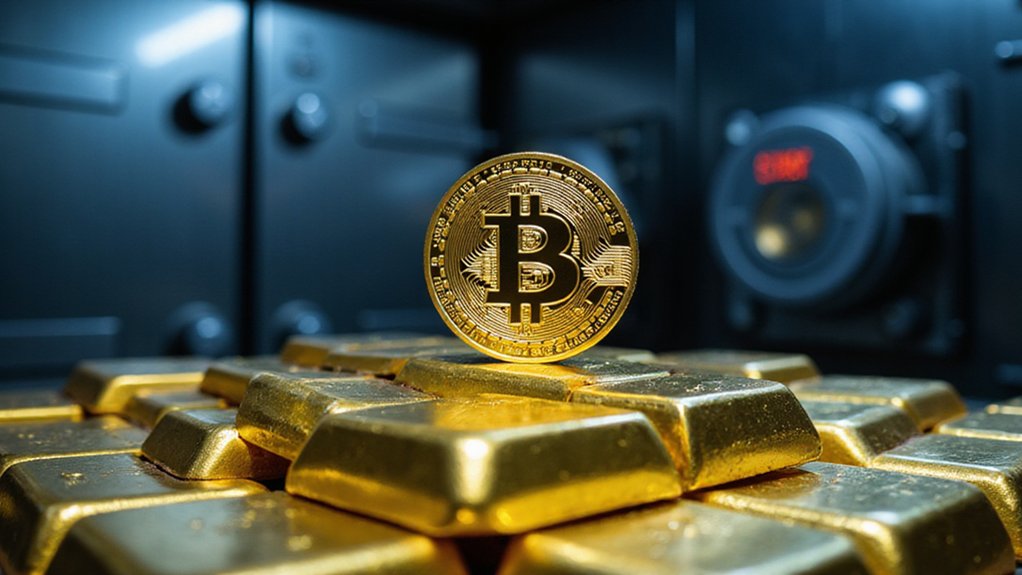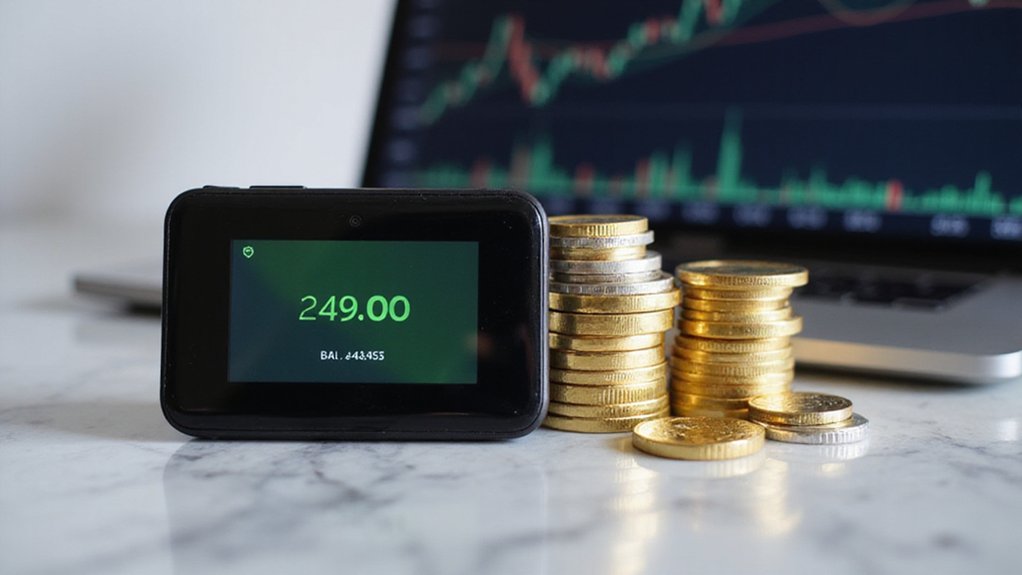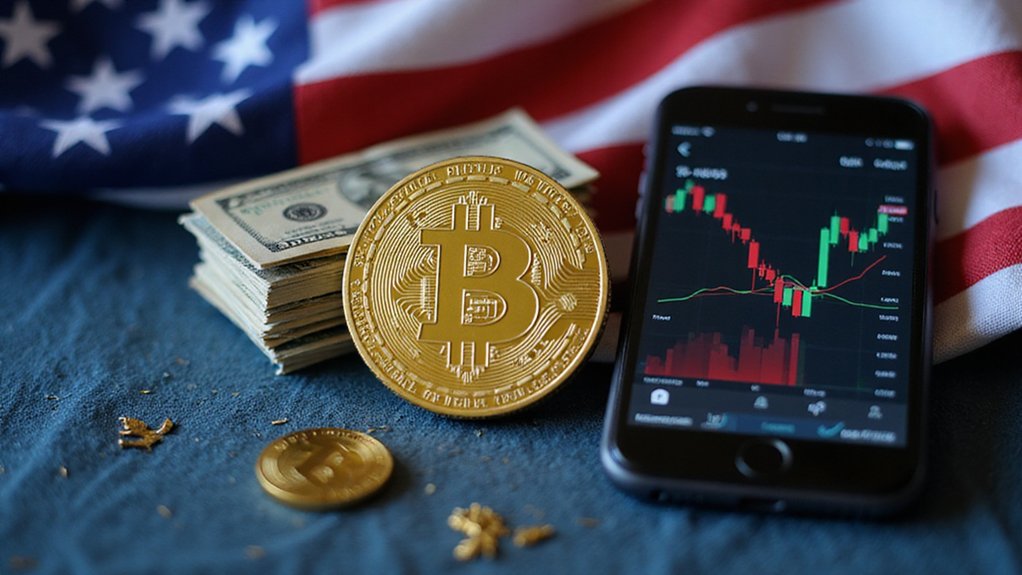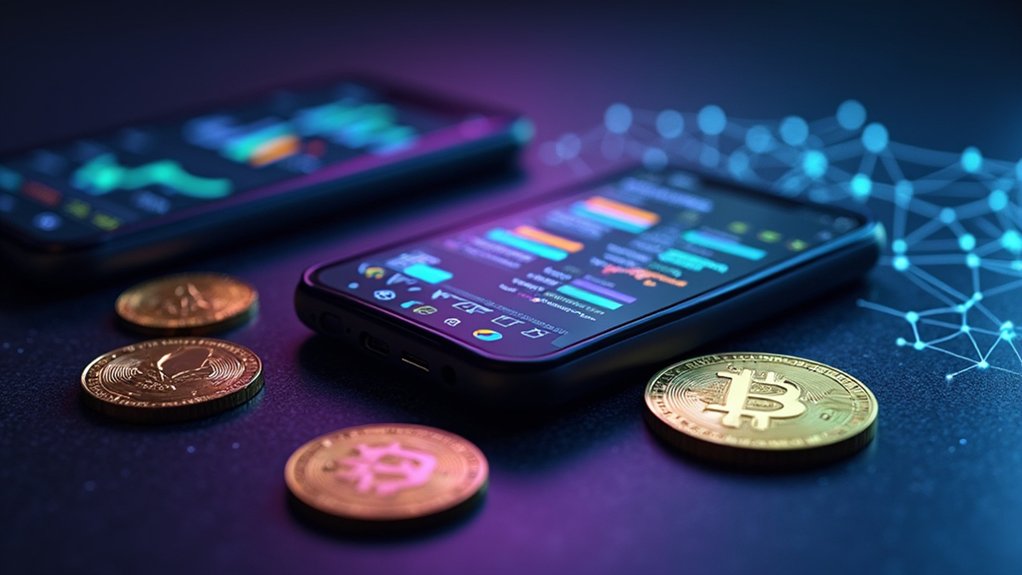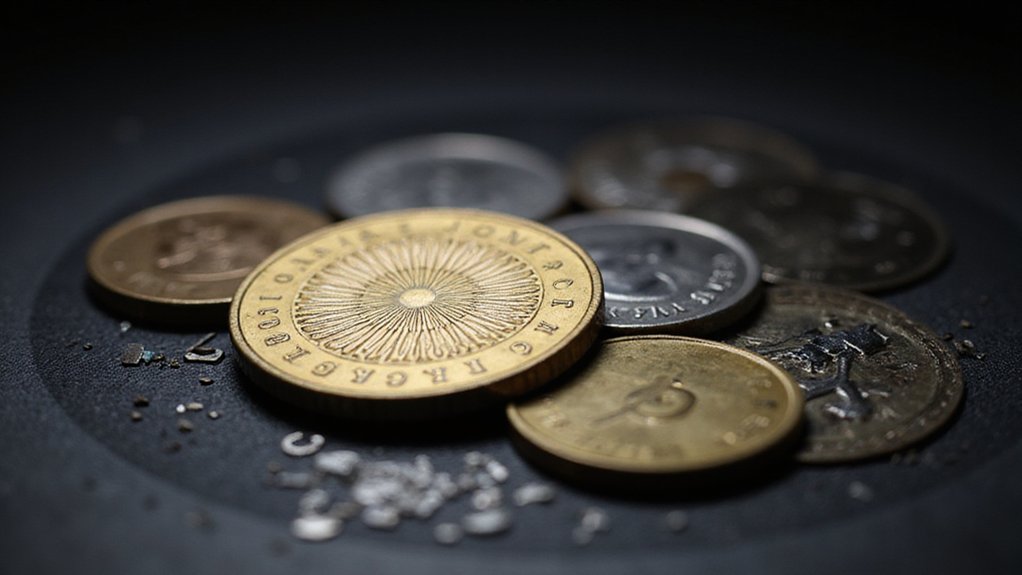Bitcoin functions as digital bullion for investors seeking shelter from fiat’s endless expansion—a genuine scarcity asset capped at 21 million coins. Nations (including the U.S. with its Strategic Bitcoin Reserve) have recognized its value alongside traditional reserves, while institutions add it to balance sheets for inflation protection. Its decentralized protocol resists manipulation, offering transparency through immutable ledgers. As markets gyrate and currencies falter, this new reserve asset‘s appeal—beyond mere speculation—becomes increasingly evident.
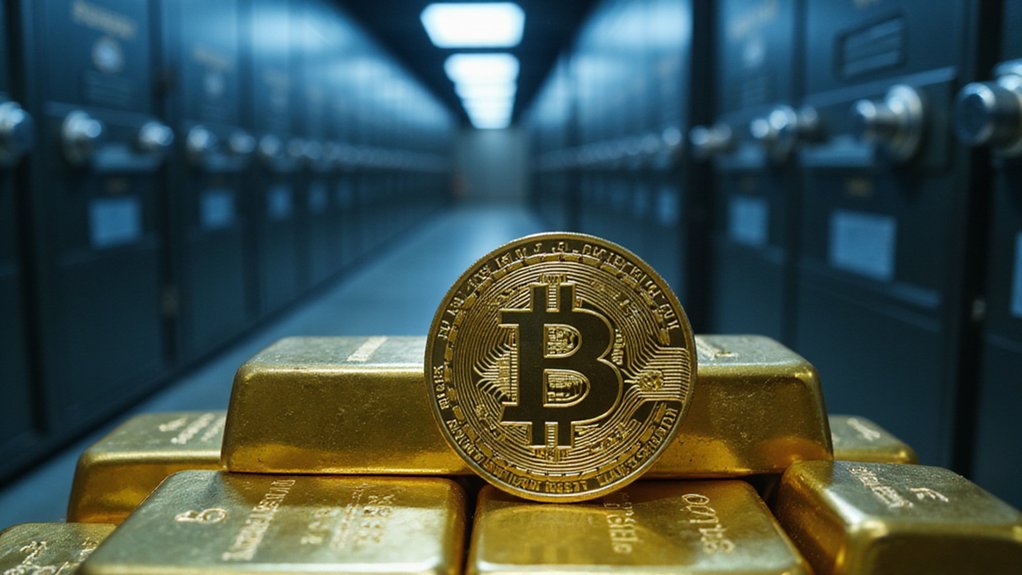
The emergence of Bitcoin as a strategic reserve asset represents a paradigm shift in how investors—from individuals to sovereign states—conceptualize financial security in the digital age.
Following in the tradition of gold and foreign currencies, Bitcoin offers a decentralized alternative with unique properties that make it increasingly attractive as a component of financial reserves.
Its mathematically enforced scarcity—capped at 21 million coins—stands in stark contrast to the seemingly limitless expansion of fiat currencies worldwide (a phenomenon that, remarkably, continues to surprise central bankers when it results in inflation).
Bitcoin’s 21 million coin limit creates genuine scarcity—a stark antidote to the perpetual expansion of fiat currencies that somehow mystifies central bankers.
The United States has recognized this potential, establishing a Strategic Bitcoin Reserve capitalized with forfeited digital assets—an ironic twist where seized contraband becomes national treasure.
Other nations are following suit, recognizing that early adoption may confer significant strategic advantages in an increasingly digital global economy.
During periods of financial instability, such reserves could provide a critical buffer against market turbulence.
For institutional and individual investors alike, Bitcoin reserves function as sophisticated risk management instruments.
They offer liquidity during volatile market conditions while simultaneously serving as potential stores of value independent of traditional banking systems.
The diversification benefits alone merit consideration, particularly as correlation patterns between Bitcoin and conventional asset classes continue to evolve in unpredictable ways.
Bitcoin’s decentralized nature and fixed supply represent compelling characteristics for reserve allocation.
Unlike government-issued currencies subject to political manipulation, Bitcoin operates on transparent protocols resistant to inflationary pressures.
This transparency extends to its transaction ledger, where movements are immutably recorded yet privacy options remain available.
Institutional acceptance continues to accelerate, with corporations adding Bitcoin to their balance sheets and regulatory frameworks gradually adapting to accommodate this emerging asset class.
The U.S. Digital Asset Stockpile Strategy has expanded beyond Bitcoin to include diverse cryptocurrencies seized through civil and criminal forfeitures, broadening the government’s portfolio approach to digital assets.
The economic implications are substantial—potentially enhancing financial stability while providing hedges against both currency risk and inflation.
Past government policies resulted in premature sales of Bitcoin holdings that reportedly cost U.S. taxpayers over $17 billion in lost value appreciation.
In March 2025, the Trump administration removed obstacles by directing that banks no longer need advance permission for cryptocurrency activities, further legitimizing Bitcoin as a mainstream financial asset.
As technological advancements in blockchain continue and regulatory clarity improves, the concept of Bitcoin reserves will likely expand beyond early adopters, representing not merely a trend but a fundamental innovation in financial strategy for the digital century.
Frequently Asked Questions
How Does Bitcoin Reserve Differ From Traditional Gold Investments?
Bitcoin differs from traditional gold investments in several fundamental ways.
While gold exists physically, requiring secure storage and presenting logistical challenges for transport, Bitcoin exists digitally with 24/7 trading capability.
Gold offers millennia of stability with moderate returns and inflation protection, whereas Bitcoin presents higher volatility coupled with potentially greater returns.
Additionally, Bitcoin’s programmable nature, divisibility, and borderless transmission capabilities represent technological advantages that physical gold simply cannot replicate—regardless of how brightly it shines.
What Security Measures Protect Bitcoin Reserve From Cyber Attacks?
Bitcoin reserve assets are safeguarded through a multi-layered security architecture that would make Fort Knox seem quaintly obsolete.
The cornerstone defenses include offline “cold storage” with air-gapped infrastructure, multi-signature authorization protocols requiring multiple parties to approve transactions, geographically dispersed physical vaults, and hardware security modules for cryptographic key protection.
These measures—complemented by regular security audits and extensive insurance coverage—create a fortress-like ecosystem remarkably resistant to the digital brigands of our age.
Can Bitcoin Reserve Be Held in Retirement Accounts?
Bitcoin Reserve can indeed be held in retirement accounts through self-directed IRAs that permit cryptocurrency investments.
Investors can leverage the same contribution limits as traditional IRAs while potentially enjoying tax-deferred growth (traditional) or tax-free gains (Roth).
Custodians manage the complex storage requirements via multi-signature wallets and handle requisite IRS reporting.
However, extreme volatility, regulatory uncertainty, and the GAO’s recent warnings highlight substantive risks when incorporating such speculative assets into one’s retirement strategy.
How Is Bitcoin Reserve Taxed Across Different Jurisdictions?
Bitcoin taxation varies dramatically across jurisdictions.
The US treats it as property, triggering capital gains upon disposal.
El Salvador, having adopted it as legal tender, exempts certain transactions from capital gains taxes.
Singapore imposes no capital gains tax, though revenue-generating activities may incur income tax.
Germany exempts private holdings after one year, while Japan taxes crypto at progressive rates reaching 55%.
Corporate entities generally face stricter frameworks than individuals, with holdings typically classified as intangible assets under GAAP/IFRS standards.
What Happens to Bitcoin Reserve During Major Internet Outages?
During major internet outages, the Strategic Bitcoin Reserve remains secure through sophisticated redundancy systems.
The Treasury Department’s cold storage protocols—offline hardware wallets physically secured in undisclosed locations—provide resilience against connectivity failures.
Backup generators, independent networks, and manual override capabilities guarantee operational continuity even in catastrophic scenarios.
While retail investors might panic during such disruptions (predictably), the institutional architecture supporting the reserve incorporates multiple failsafes that function independently of public internet infrastructure—a prudent design feature for assets of national significance.
